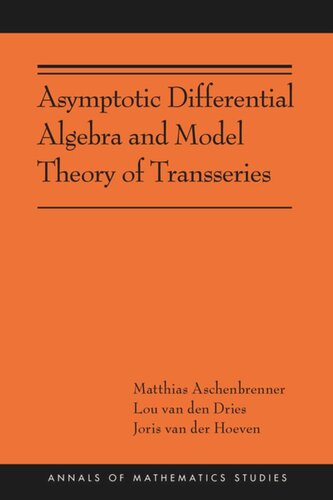

Most ebook files are in PDF format, so you can easily read them using various software such as Foxit Reader or directly on the Google Chrome browser.
Some ebook files are released by publishers in other formats such as .awz, .mobi, .epub, .fb2, etc. You may need to install specific software to read these formats on mobile/PC, such as Calibre.
Please read the tutorial at this link: https://ebookbell.com/faq
We offer FREE conversion to the popular formats you request; however, this may take some time. Therefore, right after payment, please email us, and we will try to provide the service as quickly as possible.
For some exceptional file formats or broken links (if any), please refrain from opening any disputes. Instead, email us first, and we will try to assist within a maximum of 6 hours.
EbookBell Team

5.0
48 reviewsAsymptotic differential algebra seeks to understand the solutions of differential equations and their asymptotics from an algebraic point of view. The differential field of transseries plays a central role in the subject. Besides powers of the variable, these series may contain exponential and logarithmic terms. Over the last thirty years, transseries emerged variously as super-exact asymptotic expansions of return maps of analytic vector fields, in connection with Tarski's problem on the field of reals with exponentiation, and in mathematical physics. Their formal nature also makes them suitable for machine computations in computer algebra systems.
This self-contained book validates the intuition that the differential field of transseries is a universal domain for asymptotic differential algebra. It does so by establishing in the realm of transseries a complete elimination theory for systems of algebraic differential equations with asymptotic side conditions. Beginning with background chapters on valuations and differential algebra, the book goes on to develop the basic theory of valued differential fields, including a notion of differential-henselianity. Next, H-fields are singled out among ordered valued differential fields to provide an algebraic setting for the common properties of Hardy fields and the differential field of transseries. The study of their extensions culminates in an analogue of the algebraic closure of a field: the Newton-Liouville closure of an H-field. This paves the way to a quantifier elimination with interesting consequences.